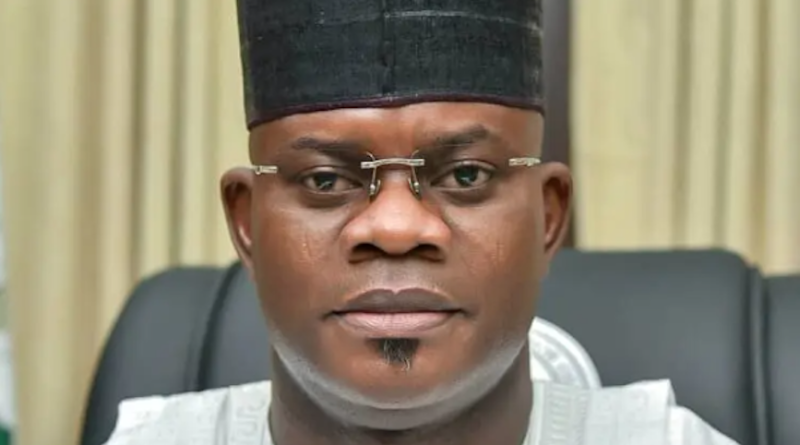More bank officials testify in Yahaya Bello’s corruption trial
Mshelia Bata, an EFCC witness in the money laundering trial of former Governor Yahaya Bello of Kogi, stated on Monday that he believes the state government’s fund withdrawals did not breach any banking law.
Mr Bata stated this while being cross-examined by the ex-governor’s counsel, Joseph Daudu, before Justice Emeka Nwite of the Federal High Court in Abuja.
He also said that Mr Bello’s name did not appear as a beneficiary in the account statements presented as evidence in court.
Mr Bata, a Compliance Officer with Zenith Bank, testified as the 4th prosecution witness (PW-4).
Under cross-examination, Mr Daudu drew the witness’s attention to certain withdrawals by Umar Olufunke, which he said the prosecution did not mention while being led in evidence-in-chief.
Mr Bata told the court that Mr Olufunke’s withdrawals, in multiples of N10 million, were between December 2017 and April 2018, with beneficiaries being various hotels in Kogi.
The witness also confirmed withdrawals by Alhassan Omakoji between November 2021 and December 2022, which he said did not exceed N10 million per withdrawal.
He said the withdrawals were in line with the limits set by the Central Bank of Nigeria (CBN).
He equally admitted that he was not aware of any law that regulates how the Kogi State Government spends its money or allocation.
“Confirm as compliant officer that when multiples of cheques of N10 million are presented, the customers are merely adhering to the withdrawal limits set by the CBN?” Mr Daudu asked.
“Yes, my lord, the N10 million on the cheque is the maximum allowed threshold on cash withdrawal set by CBN,” he said.
When asked if Mr Bello’s name appeared as beneficiary on Exhibit 22, which he (Daudu) and lawyer to the prosecution, Kemi Pinheiro, had taken him through, Mr Bata said: “No, my lord, the name, Yahaya Bello, does not appear as beneficiary.”
When asked if there is any law that regulates how the state government spends its money, the witness said: “I am not aware of any law that regulates how Kogi State Government spends its money or allocation in its account.”
He said, apart from the beneficiaries, such as the hotels mentioned in the account statements, there was no way he could know what the state’s transactions were intended for.
Justice Nwite then discharged the witness after Mr Pinheiro informed that there was no re-examination.
The witness had, at the last hearing, confirmed that the former governor was neither a signatory to nor connected with any of the accounts presented as evidence.
He admitted that, going through Exhibit 22A, from pages 24 to 413, Mr Bello was not listed on any of the documents as a beneficiary of any transaction.
The anti-graft agency also called its 5th prosecution witness (PW-5), Jesutoni Akoni, a compliance officer with Ecobank Plc, who was led in evidence by another prosecution counsel, Chukwudi Enebeli.
The witness tendered a summons letter written to Ecobank, which was admitted in evidence.
The EFCC lawyer also sought to tender a statement of account of Moses Ailetu companies, with a certificate of identification, from 1 to 31 January 2016.
Mr Daudu did not oppose it, and it was admitted as an exhibit.
Mr Enebeli told the witness to identify the different columns in the statement, which he did.
He was told to confirm cash deposits by the company, which were between N3 million and N20 million, and totalling N57 million.
Ms Akoni, while being cross-examined by Mr Daudu, equally confirmed that Mr Bello was not a beneficiary of the said deposits.
“Confirm that any of the deposits you identified carries the name of Yahaya Bello,” Mr Daudu asked.
“None of them carries the name, Yahaya Bello,” she said.
Mr Akoni also admitted that it was not possible to discern the source of funds from the face of the documents.
The prosecution, thereafter, introduced its PW-6, Mohammed Hassan, who was also on subpoena from Keystone Bank.
Mr Hassan, a relationship officer with the bank, was asked to produce the statements of account of Dantata and Sawoe Construction Company.
The documents were tendered as an exhibit, along with the certificate of identification, after the defence lawyer did not oppose.
After the PW-6 was cross-examined, the EFCC called its PW-7, Olomotame Egoro, a compliance officer on subpoena from Access Bank.
He was led in evidence by Mr Pinheiro.
He confirmed to the court that he had 12 sets of documents that had been requested.
“We supplied sufficient customer’s details that were extracted from the account opening packages at the time the customer opened the account,” he said.
READ ALSO: EFCC declares former governor wanted over alleged $14.85m fraud
The defence counsel did not object to the admission of the account statements, but opposed to some other documents attached, which he regarded as irrelevant to what the prosecution requested.
“I am not going to object to the account proper, but I will object to all the 12 purported extractions from the account opening documents attached.
“But I will not object to the statements of account, which were subpoenaed,” Mr Daudu stated.
The senior lawyer prayed the court to direct the prosecution to remove “all the extraneous documents attached,” and the prosecution team detached those documents regarded as irrelevant.
Justice Nwite subsequently adjourned the matter until 11 November for the continuation of the trial.
Mr Bello, who served as governor of Kogi State from January 2016 to January 2024, is facing trial on 19 counts of money laundering involving the alleged diversion of N80.2 billion from the Kogi State Government’s accounts.
The EFCC is also prosecuting Mr Bello in a separate corruption case at the FCT High Court for allegedly diverting N110 billion meant for the Kogi State government.


